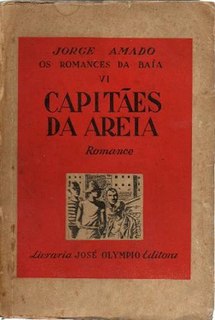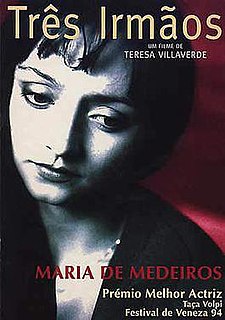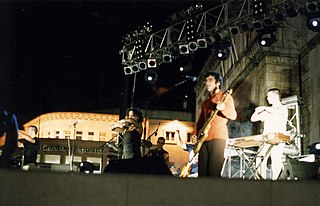
Captains of the Sands is a Brazilian novel written by Jorge Amado in 1937.
Marcelle Bittar de Almeida, better known as Marcelle Bittar, is a Brazilian model of Lebanese descent.

O Xangô de Baker Street is 2001 Brazilian-Portuguese film directed by Miguel Faria, Jr., based on the novel of the same name by Jô Soares. The film was first announced in 1996, but filming only started on September 1998 in Porto, Portugal, lasting until 1999.

Paulo Pires is a Portuguese television and film actor and former stage actor and fashion model, known for his work in Portuguese and Spanish television and films. He was named Portuguese Theatre Personality of the Year in the 1996 Portuguese Golden Globes. In October 2008 The Biography Channel aired a documentary covering 20 years of his life and work in entertainment.
April Captains is a 2000 film telling the story of the Carnation Revolution, the military coup that overthrew the fascist dictatorship in Portugal on 25 April 1974. Although dramatised, the plot is closely based on the events of the revolution and many of the key characters are real - such as Captain Salgueiro Maia and Prime Minister Marcelo Caetano.

Stefano Lelio Beniamino Accorsi is an Italian actor.

Luciano Grostein Huck is a Brazilian TV host and entrepreneur. Since 2000 he has hosted the TV show Caldeirão do Huck, aired every Saturday on Brazilian network Rede Globo, and also broadcast to 114 countries, via Globo International.
Henrique Viana was a Portuguese actor who worked in theatre, cinema and television. He died of cancer in Capuchos Hospital, aged 71.
Vitor Manuel Rodrigues Alves was a Portuguese soldier and politician. Alves, a former Captain of the Movimento das Forças Armadas (MFA), is regarded as a leading figure in the Carnation Revolution, which transitioned Portugal from an authoritarian dictatorship to a democracy.

Três Irmãos is a 1994 Portuguese drama film directed by Teresa Villaverde.
Joaquim Leitão, ComIH, OM is a Portuguese film director. He won two Golden Globe Awards, in 1996 for Adão e Eva and in 1998 for Tentação.
No Trace of Sin is a 1983 Portuguese drama film directed by José Fonseca e Costa. The film was selected as the Portuguese entry for the Best Foreign Language Film at the 56th Academy Awards, but was not accepted as a nominee.
The 2000 Golden Globes (Portugal) were held at the Coliseu dos Recreios, Lisbon on 2 April 2000.
The 2002 Golden Globes (Portugal) were held on 7 May 2002.
The first edition of the Golden Globes (Portugal) was in 1996.
The 1997 Golden Globes (Portugal) were the second edition of the Golden Globes (Portugal).
The 1998 Golden Globes (Portugal) were the third edition of the Golden Globes (Portugal).
The 1999 Golden Globes (Portugal) were the fourth edition of the Golden Globes (Portugal).











